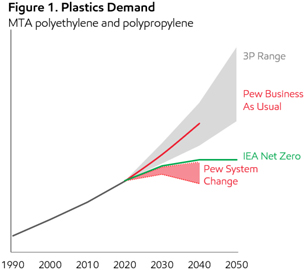Item 6: Report on Plastic Production Under SCS Scenario
For the third year in a row, As You Sow is asking our investors to consider a report on financial impacts to our business based on the narrow, prescriptive, and increasingly outdated System Change Scenario (SCS) in Pew’s Breaking the Plastic Wave report.7
We have already demonstrated the resiliency of our business and investment portfolio – including plastics – under a scenario with a lower-demand profile, like the Pew SCS.
We assess our resiliency against a range of future scenarios, and we already make this information available to the public. In our 2024 Advancing Climate Solutions Report,8 we modeled a hypothetical business and investment portfolio, inclusive of our Chemicals Business and plastics production, under the International Energy Agency Net Zero by 2050 (IEA NZE) scenario, which assumes 30% growth in primary chemicals demand from 2020-2050. IEA acknowledges that society is not on the IEA NZE pathway, and society has in fact moved farther from this pathway since it was first published in 2021.
The vast majority of third-party projections show continued growth in the demand for plastics, as displayed in Figure 1.9
The Pew report only offers assumptions for a subset of plastics demand that they identify as 64% of the market10 – largely made up of non-durable plastics. If the full plastics market is considered under the Pew SCS, polyethylene and polypropylene demand in 2040 ranges from 27% growth to 4% reduction versus 2020.9 Even at the low end, that is similar to the demand between 2018-2022. Our average earnings for our Chemical Products business in that period (2018-2022) was more than $3 billion.11

Rather than working backward from a predetermined outcome, the Pew report’s Current Commitment Scenario focuses on public and private sector commitments made between 2016 and 2019. If all of the included regulations, restrictions, and bans came to pass by 2040, global plastic demand would fall by less than 5%.12 Applying that reduction to our Chemicals Business earnings over the last five years13 would show a decrease in corporate earnings of less than 1%.11,14
To be clear, our existing analysis and disclosures already cover a reduced-demand scenario – yet another report on a similar scenario would not be meaningful.
ExxonMobil has a long and successful track record of operating in cyclical businesses like plastics.
Our strategy starts with our commitment to be the lowest-cost supplier, which is important to remaining resilient through the business cycles. While margins are now at bottom-of-cycle, long-term chemical demand is expected to grow at 20% above global GDP. We expect our Chemical Products business to contribute more than $3 billion of earnings growth by 2027 versus 2019.15
The Pew report was NOT developed for use in corporate strategy or financial modeling.